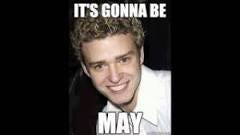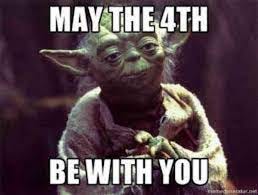"I'm Not a Math Person"
Evaluating and (reevaluating) our strengths and weaknesses
Hi all,
Before we get to the previously drafted intro - first things first: democracy for women’s rights (so, you know, democracy in general) is alarmingly under threat and it’s horrifying. The best way to help, especially if you’re like me and can’t vote in the US, is to donate directly to an on-the-ground organization, (and in a state where abortion would likely be outlawed if Roe vs Wade was overturned).
Onward to the newsletter.
Happy May!
On April 30th, the Heardle of the day (the name that tune equivalent of Wordle that I shared about, ironically, in my post a few weeks ago on “deep work”) was this song:
Because, of course, even though it has been meme’d and re-meme’d and beaten to death…this is still LOL-worthy:
And now suddenly it is. What do we do with May? It’s not quite summer, but the long weekend at the end of the month (Memorial Day for my American readers, ambiguous holiday referred to as ‘May Long’ by my Canadian readers*) signifies the start of summer, so it’s likely that our minds are heading in that direction… I don’t know about you, but I’m in a weird headspace, where part of me wants to start getting excited about summer plans (travel! rescheduled wedding festivities! outdoors!)… but like, COVID is still crashing things and disrupting plans… or even worse, the risk of COVID is still hovering around in the corner, threatening to maybe ruin plans, but not like get anyone really sick… merely alter them just enough to incur annoying change fees.
*ok yes, I know that it’s technically Victoria Day, but it’s not a stat holiday in Nova Scotia, New Brunswick, Newfoundland and Labrador and PEI, and Quebec (of course) went rogue and renamed in National Patriotes Day in 2022.
I’m sure you guys are really here to roll your eyes at cheesy month of May memes.. so here you go:
Alright, those are my ramblings. Without further ado.. this week’s newsletter topic!
Let’s talk about strengths and weaknesses.
Maybe you’re coming up on your mid-year review and being asked to evaluate these attributes directly. Maybe you’re looking at new jobs, and trying to line up the job description’s bullet points with your strengths and weaknesses toolkit (and prepare answers for those inevitably awkward interview questions). Maybe you’re a type-A, high anxiety person who periodically runs through this list of personal strengths and weaknesses daily because that’s what you’re inclined to do.
I wrote about a similar topic almost exactly a year ago in a post called “Do I Need to Be Good at Everything” (subtitle: “No”), linked below:
The genesis of the post was about owning and reframing our weaknesses:
I wrote about dismantling the fear of our weaknesses, and that owning them and having an action plan around those weaknesses could enable us to double down on our strengths and enable us to thrive.
In this year’s post, I want to dig one level deeper around the nuances of what we consider to be hard line “strengths” and “weaknesses”, whether it makes sense to invest more in developing our weaknesses vs building our strenghts, and how the concepts might evolve over the course of our careers. The takeaways: I don’t think strengths and weaknesses are rigid traits. And when it comes to choosing between investing time to improve weaknesses or doubling down on my strengths? The short answer is: It might depend on your career stage.
Early in your career, even though you might believe you have a deep knowing of your strengths and weaknesses, but you may not yet, and (surprise!) strengths and weaknesses aren’t immutable
In the mid stage of your career, you have a better sense of truly what your strengths and weaknesses are, and are in a stage of needing to earn credibility. You’re also likely working hard, and you have limited time. Focus on your strengths
And when you’re senior in your career, this one is trickiest, and takes us almost full circle back to the first bullet in this list. Once you’ve advanced to this stage in your career, you might have (dangerously) unshakeable conviction in what you think your strengths are.. but is there such thing as too much of a good thing? It might be prudent to examine your strengths and weaknesses with the exploration/growth mindset of someone early in their career again.
I’ll elaborate below.
But first, let’s explore the broader concept. We have been told our whole lives that we each have a set of strengths, and a set of weaknesses. Implicitly, we’re told that these attributes and finite. There’s some failure of imagination here, but I suppose this is what large scale performance analysis requires, both in educational and career settings.
I get why intrinsically, we like classifying our traits into strengths and weaknesses, it feels good and self-affirming to loudly declare our strengths. In permanent marker. It fortifies our sense of identity. We love personality tests (and yes, even zodiac signs) that put our attributes in clean boxes, because to some extent, it explains our behaviours and enables us to match up alongside other people, and job opportunities.
Of course, there are talents and interests that may seem innate, or natural to some, even as a child or teenager… we all have a hunch before we’re fully formed adults as to what our strengths might be. Likewise, there are some things that we don’t grasp as easily or as quickly as others. In those cases, we either self-identify those things as weaknesses - or, the educational program we’re in nudges us to identify those as weaknesses, by separating students into differing levels).
One of the most common and adamant examples of this, is the division of people into “math people” or “non-math people”.
The division of people into ‘rulers’ and ‘blobbies’ (aka math people and non math people) seems to imply that talents like math skills are innate, or genetic…

See how that line of thought, that certain strengths and talents are genetic, can be stereotypical? More devastating, it can be self-fulfilling - when kids don’t initially grasp certain concepts, then see others easily grasp and ace things, and also believe that talent is something they either simply do or do not have, it impacts their motivation to ever want to learn or improve.
In fact, the simple belief that strengths and weaknesses can change/improve over time can actually impact outcomes positively, as evidenced by psychological research. Students who held the belief “You can greatly change how intelligent you are” got demonstrably higher grades than students who believed “You have a certain amount of intelligence, and you really can’t do much to change it.” Even more importantly - the research showed that you could convince students in the latter group that they could increase their intelligence and aptitude with hard work and their grades and performance would also improve.
So. All that to say - strengths and weaknesses are malleable - and can change with effort, time and preparation. And, it benefits us to have a growth mindset about what we think we are good at and what we are bad at.
Ok great. So we’re breezing through high school and college: open-minded, enlightened, introspective. But then we arrive in the workplace. And before we ever sign an offer letter or get an ID badge - we are accosted in the interview process asking us to identify our “3 top strengths” and “3 top weaknesses”.
Early Career Stage - Your Strengths and Weaknesses Aren’t Fixed
Companies like these frameworks when hiring large batches of people because it helps sort them into roles and measure up against their internal objectives and culture. But just like when we’re kids learning about math, or in the corporate setting, learning about new rules or systems or processes - it might benefit us to not be too rigid in what we believe we’re good at, and what we’re not good at. We’re still learning and discovering - and the best thing we can do is adopt a mindset of, “we could be good at a lot of things”, and see, over time, what energizes us, and where we receive positive feedback. I believe this is also important when managing people early in their career - firmly pointing out areas of strengths and weaknesses in those discrete buckets can be demoralizing. When we’re early in our careers, we’re nervous to mess up and take risks. If someone (an early boss, an initial performance review) tells us we are underperforming at something - our high anxiety generation’s GREATEST FEAR), we tend to shy away from it entirely in order to not be perceived as being bad at something.
Mid-career: Brand Building
After a few review cycles and successful projects, you will have likely settled into a role that affirms what you believe your strengths. In this stage of your career, you are building credibility, you are likely focused on upward career trajectory, and you are likely proving to external stakeholders what your strengths are. You need reps. You have limited time, and there is an opportunity cost to investing in your weaknesses instead of strengths.
I recently having a conversation with an investor colleague of mine how was considering switching roles into a different strategy. She had previously been in a later-stage strategy, where a lot of the skillset involved structuring, operational improvements and and negotiating financing and legal terms. She innately felt like her strengths lay more in the partnership, relationship management and strategy side. We discussed the learning opportunity that staying in the existing strategy would afford her - she could improve her perceived weaknesses in the more structural/operational set of skills. But then we discussed her overarching career goals that overlay this decision - she was past the stage of her career of discovering strengths and weaknesses, and she was focused on moving up in title and responsibility. Moving to an earlier stage investing strategy would give her considerably more opportunities to be an advisor or board member/advisor - more ‘at-bats’ for her to flex her relationship and strategic muscle. It would also enable her to spend time with colleagues and mentors who were even more adept than her at the strength.
By the way, psychologically - it just feels better to invest in our strengths than in our weaknesses. Gallup (a consulting company that focuses on employees and customer satisfaction) found that employees feel more confident, self-aware and productive when focusing on strengths rather than weaknesses. When we’re in the hustling mid-stage of our careers, we want to feel affirmed and productive.
Mid-career stage, when we focus on our strengths, it’s also a good chance to practice delegation - handing off the things we’re not well-versed in to others (again, reference last year’s post on weaknesses for tips).
Senior in your Career - Too Much of a Good Thing?
Traditional career evaluations look like this.

The same attributes that you pride yourself on, can veer into overkill territory. Especially when we’re later in our careers and have many years (or decades) of affirmations that something we’re doing works. For me, it’s being empathetic, for others it could be a strong bias to action, or being an aggressive deal maker. All of these things superficially seem like great attributes in a leader, but there’s a flipside to potentially all of them. Being enabling and empathetic might lead to delayed decision making. Having a string bias to action may ignore consensus building. Too much of a strength can become a weakness.
The solution? The first step is pausing for a second to consider that our prized strengths might be contributing to a behaviour or skill that is actually a blindspot or weakness. The next is mustering up the vulnerability to ask for feedback from your colleagues and reports on where you’re “off the charts!” (and not necessarily in a good way.
As important as the strength, is the situation. Adam Grant (another favourite of this newsletter) wrote in the New York Times, that the nuance in using your strengths, is not to maximize how frequently you use them, but to use them wisely in the right contexts. Maybe you’re a confident, terrific communicator that deftly controls meetings - you don’t need to be that person at team social events and dinners.
Would love to hear from you! What career stage are you in? Early on and still determining where your strengths lie? Mid-stage and earning credibility by building reps in the things you’re proven to be good at? Later in your career and perfecting the nuance?
Resources/Links
Stop Overdoing Your Strengths - published back in 2009 (Harvard Business Review)
Don’t Let Your Strengths Become Your Weaknesses - published in 2013, HBR noticed that the trend in management and leadership development was to really double down on strengths development and rehashed this article, and wrote a book “Fear Your Strengths” and developed an alternative assessment tool, the Leadership Versatility Index (Harvard Business Review)
The Myth of “I’m Bad at Math” (The Atlantic)
Cool ladies doing cool things: Briogeo, a Black woman-founded haircare line focused on clean products, was acquired by leading beauty and haircare company Wella. Especially exciting, because in addition to being a leading beauty founder/CEO and absolute powerhouse, Briogeo CEO Nancy Twine is a friend, also an ex-Goldman alum, coincidentally my birthday twin and just an all-around excellent human! (Allure)
PS, if you personally know ladies doing cool things, and would like to share their work, LinkedIn profiles, or anything else, let me know!











